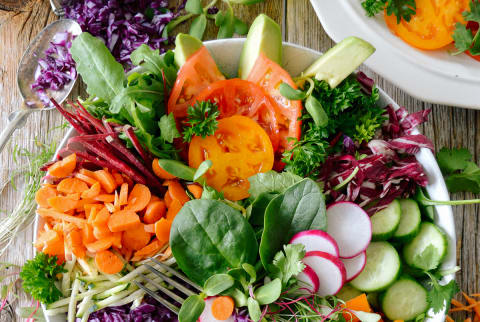Advertisement
Why You Should Eat One Salad A Day For Brain Health + How To Stop Making Boring Salads


Want a more youthful brain? Aim to consume a big salad every day, a practice associated with reduced brain aging by up to 11 years. Fill the salad with dark leafy greens like kale, spinach, or arugula, and always include a fat source, like an egg, a piece of fatty fish, or a tablespoon or two of extra-virgin olive oil. This allows for the absorption of carotenoids (plant pigments) like lutein and zeaxanthin, which are found in the greens.
While the average adult over the age of 50 consumes fewer than 2 milligrams of these two compounds daily, 6 milligrams per day of combined lutein and zeaxanthin are essential to help prevent age-related macular degeneration, and 12 milligrams per day may improve your memory in part by supporting your brain's ability to create energy1.
How you can make the best brain-boosting salad, every time.
For those powerful brain-boosting compounds to be absorbed and thus utilized by your body, a fat source must be consumed with them. This is one reason avocados are near-perfect brain food—not only are they a low-sugar fruit rich in heart-healthy potassium and fiber, but they provide both lutein and zeaxanthin as well as a hefty dose of healthy fat to ensure that those compounds don't go to waste.
Once you've filled your salad with greens, remember that there are no rules. I love adding sunflower seeds (which offer a powerful hit of brain-nurturing vitamin E) and herbs like cilantro. Switch it up so you don't get bored; there are infinite possibilities to ensure that your daily "fatty salad" isn't a boring one! Here's how:
Screw moderation; aim for consistency.
Don't feel guilty or unadventurous for buying your favorite foods on loop, provided those foods include staples like eggs, fatty fish, dark leafy greens, grass-fed beef, cruciferous vegetables, and alliums like garlic and onions.
Incorporate a range of animal products and plants.
People have varying and clinically relevant abilities to absorb nutrients from plants or to synthesize essential nutrients from plant-based precursors. Two examples include the plant-based omega-3, alpha-linolenic acid (ALA), and beta-carotene. Conversion of each into their usable forms (EPA and DHA fat, and vitamin A, respectively) is significantly influenced by genes, and many people are poor converters. By consuming preformed omega-3s (found in grass-fed beef and fatty fish) and true vitamin A (found in beef liver and also in fatty fish), you procure insurance that these crucial nutrients will be readily utilized by your body.
Stick to single-ingredient foods.
Real foods don't have an ingredients list; they are the ingredients. Stick to single-ingredient, seasonal foods and learn simple cooking techniques incorporating a range of herbs, spices, and seasonings to ensure the full breadth of nutrition they offer.
Bitter is better.
Remember trying coffee, beer, or wine for the first time? You probably didn't enjoy them very much because of their bitter taste. But many bitter plant compounds, developed to ward off smaller critters, are potent health boosters. Think of the spicy polyphenols in extra-virgin olive oil, which give the oil its anti-inflammatory power. The digestive tract may have even evolved special receptors just for bitter taste, and activating them might impart benefits including reduced inflammation and better blood sugar management2.
You can seek these health-boosting bitter compounds in your supermarket; all you need to do is regularly incorporate into your diet foods like ginger, wild berries, arugula, dandelion greens, citrus peels, turmeric, extra-virgin olive oil, cocoa, tea, and coffee.
Adapted from the book Genius Life by Max Lugavere. Copyright © 2020 by Max Lugavere. Published on March 17, 2020, by Harper Wave, an imprint of HarperCollins Publishers. Reprinted by permission.

Why Nutrition Is Key To Changing Your Relationship With Alcohol
Brooke Scheller, DCN, CNS

Why Alcohol Sabotages Your Gut Health & How To Get Back On Track
Brooke Scheller, DCN, CNS

Why Nutrition Is Key To Changing Your Relationship With Alcohol
Brooke Scheller, DCN, CNS

Why Alcohol Sabotages Your Gut Health & How To Get Back On Track
Brooke Scheller, DCN, CNS

Why Nutrition Is Key To Changing Your Relationship With Alcohol
Brooke Scheller, DCN, CNS

Why Alcohol Sabotages Your Gut Health & How To Get Back On Track
Brooke Scheller, DCN, CNS

Why Nutrition Is Key To Changing Your Relationship With Alcohol
Brooke Scheller, DCN, CNS

Why Alcohol Sabotages Your Gut Health & How To Get Back On Track
Brooke Scheller, DCN, CNS














